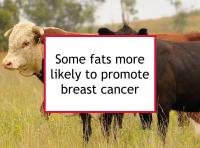Adult obesity is a well-established risk factor for breast cancer. However, it has not been clear whether the increased risk is linked mainly to the degree of overweight (i.e., the volume of fat tissue) or if dietary factors work in conjunction with overweight status. Now a new study has reported that different dietary fats have different effects on the immune system and tumor growth in obese mice.
Lard (rendered pork fat), beef tallow (rendered beef fat) and butter were found to accelerate tumor growth, whereas coconut oil, palm oil and olive oil did not have this effect.
Lard and breast cancer
Use of lard as a cooking fat is more common in parts of Eastern Europe, South America and China. Several small population studies have reported that regularly preparing food using lard is associated with increased breast cancer risk.
Studies comparing the impact of culinary oil versus animal fat intake in mouse models of breast cancer are rare. Multiple studies have examined the effects of corn oil compared to olive oil (with the consistent result that olive oil is comparatively beneficial); others have compared omega-3 to omega-6 fatty acid intakes (omega-3 fats are best). One study did examine a high-fat diet (with 60% of calories from lard) compared to a low-fat diet (with 17.2% of calories from vegetable oil) in a mouse model of triple negative (ER-/PR-/HER2-) breast cancer. The lard-based high-fat diet resulted in larger mammary tumors and higher numbers of tumors compared to the low-fat diet.
Latest research finds dietary fat influences anti-tumor immunity
The study referenced above used a variety of mouse models of cancer to investigate how dietary fats affect anti-tumor immunity or tumor growth in obese individuals.
Using groups of obese mice with equivalent obesity, the authors demonstrated that high-fat diets based on lard, beef tallow or butter accelerated tumor growth in a melanoma model, whereas high-fat diets based on coconut oil, palm oil or olive oil did not. The authors also used a mouse model of breast cancer to show that tumors in butter-fed mice grew significantly faster than tumors in palm oil-fed mice.
In further studies using butter and palm oil high-fat diets, the authors determined that each fat affected natural killer and CD8 T cell infiltration and function within the tumor microenvironment differently, with distinct effects on the metabolites found in blood plasma and chemical reactions occurring within cells. Importantly, the authors identified diet-related lipid intermediates (long-chain acylcarnitine species) which function as immunosuppressive metabolites that are enriched in obese mice fed a high-fat butter diet compared to those on a high-fat palm oil diet.
The authors conclude that the results highlight the importance of diet in maintaining a healthy immune system. Modifying dietary fat intake has the potential to improve cancer outcomes among those who are obese.
